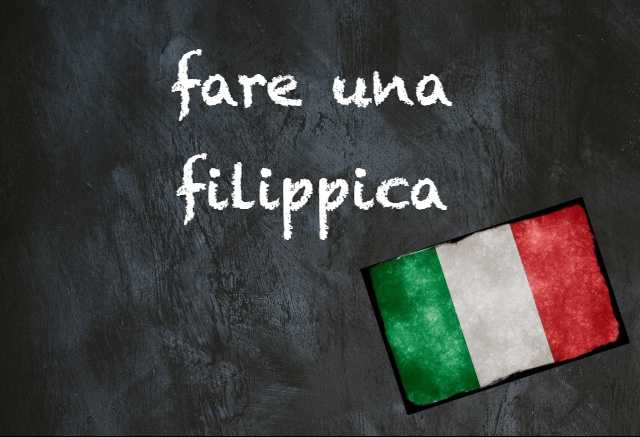Italian expression of the day: ‘Fare una filippica’

When an Italian friend is giving you an earful for being a couple of minutes late, tell them to quit the ‘philippic’. As far as idioms go, fare una filippica is one of the most popular ones used in Italian television and print media. Presenters and journalists use it every day as a way to give colour and panache to their reports.
But what is a filippica (literally, ‘philippic’ in English) and, above all, what does it mean to make one?
In Italian, the word filippica is generally used to describe a very impassioned invective: a tongue-lashing, if you will, aimed at a political adversary or any other opponent.
So fare una filippica means having a go at someone, and in a rather ferocious and hostile way.

Let’s have a look at some examples:
Il capo dell’opposizione ha fatto una filippica contro l’immobilità del governo nei confronti delle famiglie a basso reddito.
The head of the opposition harshly criticised the government’s inertia towards low-income families.
Or:
L’allenatore ha fatto una filippica contro i tifosi della squadra ospite per il loro comportamento sugli spalti.
The coach condemned the away side’s fans for their behaviour on the stands.
As you can see, on most occasions, the expression is followed by contro (‘against’) plus the person or people the invective is directed at.
As previously mentioned, the expression is widely used in broadcast and print media. However, it is also frequently used in colloquial Italian as a way to mock someone who is being overly dramatic or getting unreasonably upset about trivial matters.
For instance:
Sei sempre in ritardo. Sei insopportabile.
Sono solo due minuti. Non farmi una filippica…
You’re always late. You’re insufferable.
It’s just a couple of minutes. Don’t you dare have a go at me…
So, now that you have a basic grasp of how (and when) to use the idiom, you may also be interested in knowing where it comes from.
Like most Italian idioms, fare una filippica originated in the classical age.
Notably the expression dates back to 351 BC, when the independence of Athens, the richest and most technologically advanced city-state in ancient Greece, was being threatened by the expansionist designs of Philip II, king of Macedon.
Being conscious of the risks Macedon posed to his city’s autonomy, Athenian intellectual and statesman Demosthenes famously gave a number of fervid political speeches aimed at rallying his fellow citizens against Philip II and calling for a mobilisation of Athens’ military forces.
Such orations, whose eloquence and rhetoric are admired to this very day, were known as ‘philippics’ (‘filippiche’ in Italian), hence the very peculiar expression which, through the centuries, has made it all the way into modern Italian.
Do you have an Italian word you’d like us to feature? If so, please email us with your suggestion.
Comments (1)
See Also
As far as idioms go, fare una filippica is one of the most popular ones used in Italian television and print media. Presenters and journalists use it every day as a way to give colour and panache to their reports.
But what is a filippica (literally, ‘philippic’ in English) and, above all, what does it mean to make one?
In Italian, the word filippica is generally used to describe a very impassioned invective: a tongue-lashing, if you will, aimed at a political adversary or any other opponent.
So fare una filippica means having a go at someone, and in a rather ferocious and hostile way.

Let’s have a look at some examples:
Il capo dell’opposizione ha fatto una filippica contro l’immobilità del governo nei confronti delle famiglie a basso reddito.
The head of the opposition harshly criticised the government’s inertia towards low-income families.
Or:
L’allenatore ha fatto una filippica contro i tifosi della squadra ospite per il loro comportamento sugli spalti.
The coach condemned the away side’s fans for their behaviour on the stands.
As you can see, on most occasions, the expression is followed by contro (‘against’) plus the person or people the invective is directed at.
As previously mentioned, the expression is widely used in broadcast and print media. However, it is also frequently used in colloquial Italian as a way to mock someone who is being overly dramatic or getting unreasonably upset about trivial matters.
For instance:
Sei sempre in ritardo. Sei insopportabile.
Sono solo due minuti. Non farmi una filippica…
You’re always late. You’re insufferable.
It’s just a couple of minutes. Don’t you dare have a go at me…
So, now that you have a basic grasp of how (and when) to use the idiom, you may also be interested in knowing where it comes from.
Like most Italian idioms, fare una filippica originated in the classical age.
Notably the expression dates back to 351 BC, when the independence of Athens, the richest and most technologically advanced city-state in ancient Greece, was being threatened by the expansionist designs of Philip II, king of Macedon.
Being conscious of the risks Macedon posed to his city’s autonomy, Athenian intellectual and statesman Demosthenes famously gave a number of fervid political speeches aimed at rallying his fellow citizens against Philip II and calling for a mobilisation of Athens’ military forces.
Such orations, whose eloquence and rhetoric are admired to this very day, were known as ‘philippics’ (‘filippiche’ in Italian), hence the very peculiar expression which, through the centuries, has made it all the way into modern Italian.
Do you have an Italian word you’d like us to feature? If so, please email us with your suggestion.

Join the conversation in our comments section below. Share your own views and experience and if you have a question or suggestion for our journalists then email us at [email protected].
Please keep comments civil, constructive and on topic – and make sure to read our terms of use before getting involved.
Please log in here to leave a comment.